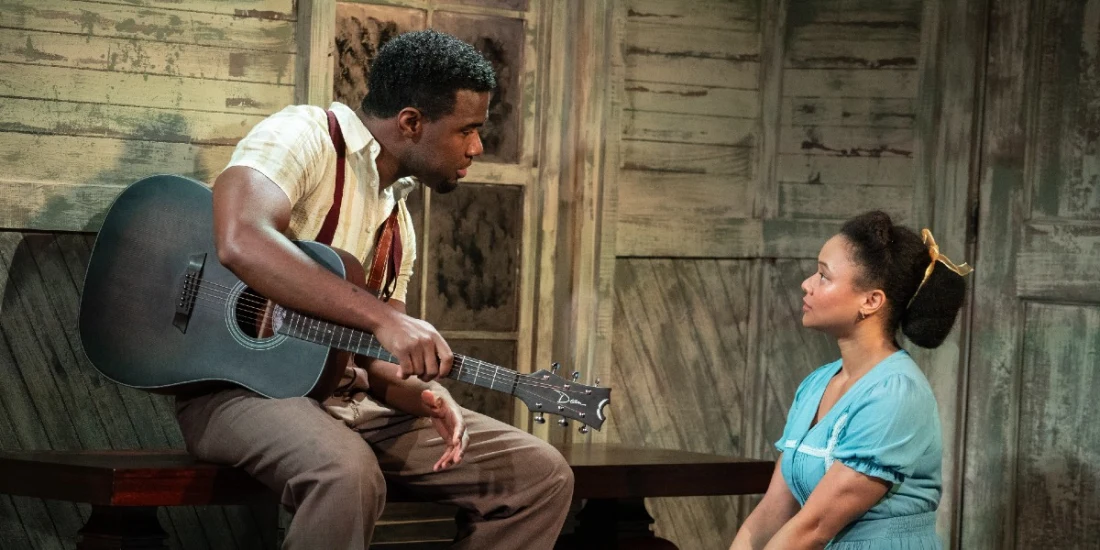‘Covenant’ review — devilish drama reimagines religion and possession
Read our four-star review of Covenant, a world-premiere play written by York Walker and directed by Tiffany Nichole Greene at Roundabout Theatre Company.
The ominous thrum of spirituals greets the audience walking into Covenant at Roundabout Theatre Company’s Harold and Miriam Steinberg Center for Theatre the wood-paneled walls the color of an old nickel. When Ruthie (Lark White) enters, in a cranberry checkered dress with a handkerchief around her head, her proclamation that “everybody’s got a secret” emerges as a growl, a mix of defiance and fear.
She's watching the musician Johnny (Chaundre Hall-Broomfield) waltz back into their hometown claiming to another woman, Avery (Jade Payton), he has the goods to make it big as a singer. In contrast to the feverish love of God and church, Johnny is the closest thing to both the heaven of freedom and the hell of the secular world that Avery, Ruthie, and Ruthie’s best friend Violet (Ashley N. Hildreth) have ever seen, with his guitar slung seductively over his back as he makes a show of his acquired nickname, “Honeycomb,” for the way he perspires on stage.
When Johnny asks to marry Avery, despite rumors that he might have made a Faustian pact for success, she jumps at the chance, leaving Ruthie, Violet, and Mama in Georgia with little word. Yet, barely two months pass and Johnny returns with Avery, her eyes now wide open, her body language jittery and manic. Johnny is ready to leave Avery and let her loved ones deal with her strangeness, only making his intentions more suspect. And then the lights flicker, the idle hum of the gateway to death opens, and the theatre fills up with the sulfuric smell of burnt matches.
If the first third of York Walker’s play has minor difficulty setting the stakes, its subtext and period dialogue occasionally butting heads, Covenant finds redemption in its reworking of the possession narrative. In Walker’s eyes, possession and exorcism aren't so much main events as they are context: for how the Jim Crow era amplifies the tension between religious practices and the hope of the modern world; how Black families’ relationship with religion can sow deep, generational pain, prioritizing salvation over love; how abuse haunts the characters’ lives; and how easily one can conflate love and possession.
Lighting designer Cha See makes good use of the scant illumination in the window, and Justin Ellington’s music and sound design sustain an entrancing, dreamlike quality. For all of Covenant’s spareness, its set, with a walkway splitting the audience and leaving a doorway to a readily available unknown, is striking in its ability to use space both economically and freely.
Because, ultimately, director Tiffany Nichole Greene understands Covenant is a showcase for the actors. Where White grounds her Ruthie in a kind of pathetic desperation, Hildreth’s Violet has the pulsating flesh and blood of someone fighting her own disillusionment and struggling to justify why she remained at home for so long. She’s sarcastic and funny, biting and electrifying, and her eyes do all the acting. They dress and undress her scene partners up and down, each action capturing both a spark of the spontaneous and the deeply felt.
Crystal Dickinson’s Mama arrives at a ferocity reminiscent of the mother in Carrie as it becomes clear Avery is deeply unwell, and Payton, at first taking a moment to settle into her goody two shoes, soon unleashes her id. It’s not so much Lucifer’s voice that leaps from her throat so much as repression and the agony of being trapped in the purgatory of a religious home.
Photo credit: Chaundre Hall-Broomfield and Jade Payton in Covenant off Broadway. (Photo by Joan Marcus)
Originally published on
